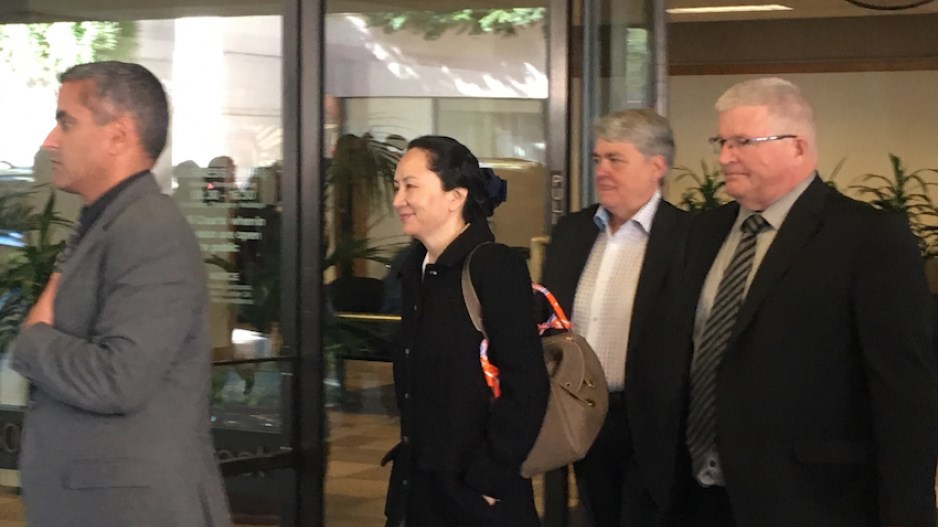The legal proceedings moved behind closed doors this month, but the battle over the potential extradition of Huawei Technologies Co. Ltd. CFO Meng Wanzhou continues to be fought along every inch of legal ground that is available.
The latest round of hearings, which started with an August 17 public hearing, then moved quickly into closed-door hearings because of the presence of what Crown prosecutors call materials sensitive to national security, is centred on communications between the Attorney General of Canada and enforcement agencies like the RCMP on December 1, 2018, the day of Meng’s arrest at Vancouver International Airport.
Meng’s defence team has made a wide-ranging request for all the communications relevant to the Huawei executive’s arrest to be made available. It argues the documents may give some sense of why Canadian border agents detained Meng for three hours – collecting laptops, hand-held devices and other evidence during that time – before the RCMP formally arrested her.
In BC Supreme Court documents filed by the Crown in response, counsel for the Attorney General of Canada Marta Zemojtel said the Crown has been co-operative in releasing documents “liberally to comply with the disclosure order” issued by Associate Chief Justice Heather Holmes back on December 9, 2019.
But Zemojtel argued in the latest filing that, despite the Crown working with an amicus (a voluntary impartial adviser) to disclose or reduce the redactions in many more documents, further disclosure of the information would violate the solicitor-client privilege that is fundamental to the Canadian legal system.
“Solicitor-client privilege should be set aside only in rare cases,” the Crown filing argued. “Litigation privilege is required in a functional legal system to provide a zone of privacy for litigants to develop legal strategies without the fear that communications will be disclosed to a legal adversary.”
Among the rare examples where the privilege can be set aside, according to the Crown’s argument, are cases where the innocence of the accused is at stake, where the privileged communications are criminal or where disclosure is needed to protect public safety.
“Only the first exception is potentially engaged in the case before this Court, and at best in an attenuated way since this Court has no role in determining Ms. Meng’s guilt or innocence,” Zemojtel said in the filing.
“Ms. Meng must establish that ... the information sought from the ... privileged communications is not available from any other source; and she is otherwise unable to raise a reasonable doubt or ... otherwise unable to make out her abuse of process allegations,” the document said.
Zemojtel also argued that, once the solicitor-client relationship is established (in this case between the attorney general’s office and the RCMP), the privilege covers the “entirety of the communication” – i.e. the whole collection of email liaison between the two parties on the topic of Meng’s arrest – and “does not lend itself easily” to disclosure of portions of the communication stream.
On August 17 – the only day where last week’s proceedings were public – defence lawyer Scott Fenton argued that the Crown had already waved its solicitor-client privilege when it chose to make some of the communications from the day of arrest available in court.
Fenton pointed to Crown counsel Robert Frater’s mention in court last year of a December 1, 2018, letter from the attorney general’s office to the RCMP as “a privileged document generously disclosed in proceedings,” meaning the Crown had acknowledged the privilege and intent to waive it. That waiver, the defence argued, can then be extended to all the relevant communications between those two parties on the matter of Meng’s arrest.
“If the Attorney General of Canada were given updates that [Meng] has not been immediately arrested, that is relevant – in our respectful submission – to the abuse-of-process allegations ... and should follow into that waiver,” Fenton said in court last Monday.
The hearings behind closed doors starting August 18 excluded the media, the public and Meng’s defence lawyers.
The court has appointed an amicus curiae (an approved attorney to present counter-arguments to the Crown’s case for keeping the information undisclosed) to stand in for the process of determining whether documents should be released while not divulging the information contained in those documents to defence lawyers.
Meng’s next court appearance is scheduled for September 28.




